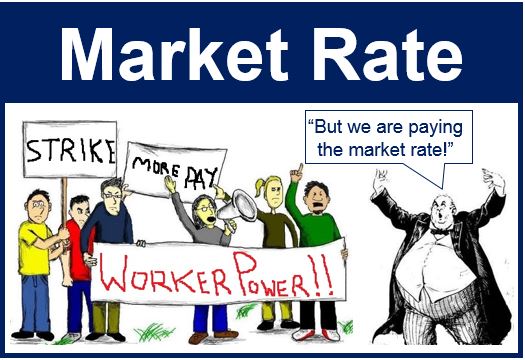What is the market rate? Definition and meaning
The market rate, also known as the going rate, is the usual price charged for a good or service in a free market, rather than one fixed by a state authority.
If demand for a product rises, producers tend to respond by pushing up its price, thus setting a higher market rate. When demand declines the opposite occurs.
Market rate is also used for employee pay. An employer who pays the market rate is paying his or her workers the going rate, i.e. the usual rate for the type of work being done.

In the world of finance, market rate refers to the rate of interest that is paid on a debt security that trades in the open market. As in goods and services, the market rate in finance responds directly to market forces (supply and demand).
The term may also be used for how much a specialist professional charges per hour. For example, “The prevailing market rate for a good lawyer is approximately $150 per hour in that town.”
Market rate may be the black market rate
When a government controls the exchange rate, often the black market rate for its currency becomes the internationally-recognized market rate.
In Venezuela, the official (government fixed) rate for the Bolivar is 6.35 per dollar. However, in the black market it is more than 700 per dollar.
Most newspapers and media sources within the country and across the world say the ‘market rate’ is over 700 per dollar.
According to FT Lexicon, market rate is:
“The real price or cost of something, decided by a market rather than calculated or fixed, for example by a government. A typical rate for something on a market at a particular time. The price of something calculated in relation to what buyers are willing to pay at a particular time.”
Video – What is the Market Rate?
This video, from our sister channel on YouTube – Marketing Business Network, explains what the ‘Market Rate is using simple and easy-to-understand language and examples.

